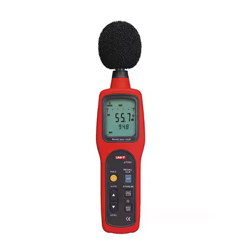Sound Level Meters : Measure Noise Levels Accurately and Easily
Pioneer offers sound level meters (also known as noise meters or decibel meters) for precise measurement of sound pressure levels in various environments. These instruments are essential for noise monitoring, environmental assessments, industrial hygiene, and ensuring compliance with noise regulations.
The Importance of Measuring Sound Levels
- Hearing Loss: Prolonged exposure to high noise levels can cause permanent hearing damage.
- Stress and Annoyance: Noise can contribute to stress, fatigue, and reduced productivity.
- Health Problems: Noise exposure has been linked to cardiovascular problems and other health issues.
- Environmental Impact: Noise pollution can affect wildlife and disrupt ecosystems.
- Legal Compliance: Many workplaces and communities have noise regulations that must be followed.
Types of Sound Level Meters
- Class 1 / Type 1 Sound Level Meters : Offer the highest accuracy and are used for precision measurements, laboratory work, and legal metrology.
- Class 2 / Type 2 Sound Level Meters : General-purpose meters suitable for most industrial and environmental noise measurements.
- Integrating Sound Level Meters : Measure the average sound level over a period of time (Leq).
- Data Logging Sound Level Meters : Record sound levels over time for later analysis.
Key Features to Consider
- Accuracy Class: Choose Class 1/Type 1 for the highest accuracy, or Class 2/Type 2 for general-purpose use.
- Frequency Weighting: A-weighting (dBA) is the most common, as it mimics the response of the human ear. C-weighting (dBC) is used for measuring peak sound levels.
- Time Weighting: Fast, Slow, and Impulse response settings determine how quickly the meter responds to changes in sound level.
- Measurement Range: Select a meter with an appropriate range for the expected sound levels.
- Display: Look for a clear, easy-to-read display, possibly with backlighting.
- Data Logging: Some models offer data logging capabilities for recording measurements over time.
- Calibration: Sound level meters require periodic calibration to maintain accuracy.
Applications
- Industrial Hygiene: Monitoring noise levels in workplaces to protect worker hearing.
- Environmental Monitoring: Assessing noise pollution from traffic, construction, and other sources.
- Noise Ordinance Compliance: Ensuring compliance with local noise regulations.
- Building Acoustics: Measuring sound levels in buildings for design and troubleshooting.
- HVAC/R: Measuring noise levels from equipment and systems.
- Product Testing: Evaluating the noise output of products.
Why Choose Pioneer Sound Level Meters?
Accurate Measurement, Wide Selection, Durable Construction, User-Friendly Design, Expert Support, Competitive prices

